Sheffield mum on the rare cancer which nearly cost her the chance to have a baby
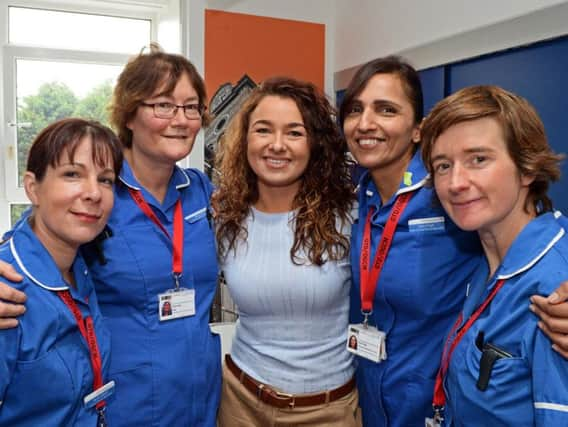

But what she didn't know in their attempt to have a child together, it would turn her world upside down after developing a condition which could have dashed her hopes of having a baby.
The 34-year-old, who works at the University of Sheffield and builder Aaron were delighted when Jodie fell pregnant back in March. An exciting future lay ahead for both of them.
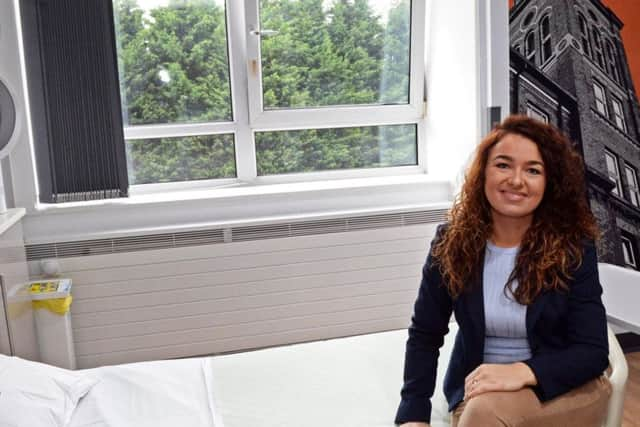

Advertisement
Hide AdAdvertisement
Hide AdBut the pregnancy turned into a hellish experience as after eight weeks, she miscarried. The pair would not be deterred and planned to try again when Jodie recovered.
"At that point we just thought it was a normal miscarriage. We went up to the hospital had the scans and the doctors were saying the same.
"We were devastated at the whole thing and the fact it would take three weeks' to recover from it but I just wasn't getting any better - it was really strange."
Feeling concerned, Jodie rang the hospital and asked for another scan. In a surprise showing, doctors found fetus tissue still present in Jodie's womb despite her miscarriage.
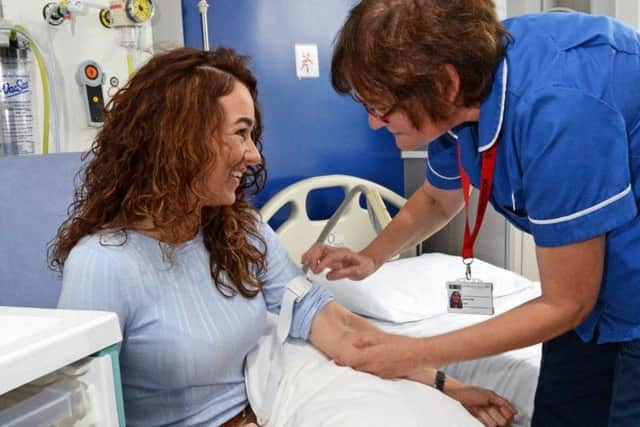

Advertisement
Hide AdAdvertisement
Hide AdTests showed she did conceive but it was never going to develop into a baby. Despite having the fetus removed a tumours grew back in its' place instead.
The formal diagnosis was Gestational Trophoblastic Disease - a rare condition that can develop during pregnancy.
The placenta is the organ that is normally formed as part of a healthy pregnancy and it produces hormones that help the baby grow and develop. It is made up of millions of cells called trophoblasts.
In trophoblastic disease there is an abnormal overgrowth of all or part of the placenta. The trophoblastic cells do not grow as they should, and form a mass of abnormal cells in the uterus.
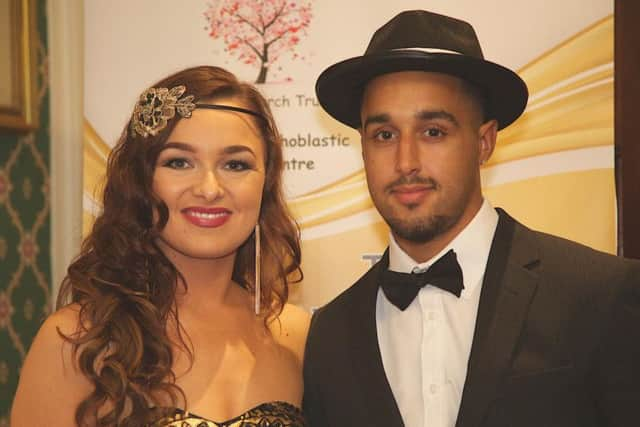

Advertisement
Hide AdAdvertisement
Hide AdThis wasn't the first time Jodie had come across Weston Park. She lost her mum to bone cancer only two years ago and it all felt very familiar.
"I read up on it and I knew it could potentially develop into cancer. At this point it wasn't classed as cancer but I was pretty scared and upset. Weston Park rang me up that day and it was Kam who I spoke to and she really great and put my initial fears at ease."
Jodie, from Walkley, booked an impromptu holiday to Portugal with 10-year-old daughter Harmonie not long after the diagnosis.
She was all packed and ready to go but fell ill and was taken into hospital again. She should've been relaxing on a beach but the holiday had to be cancelled.
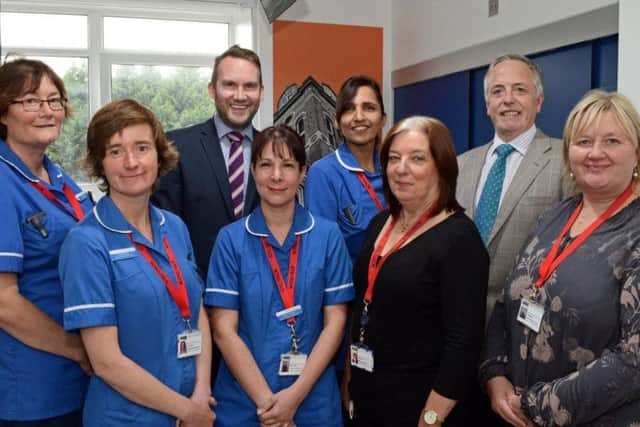

Advertisement
Hide AdAdvertisement
Hide AdJodie had the tumour removed again and began to have her pregnancy hormones monitored by staff at Weston Park. It should naturally go down - but it didn't.
"The tumour came back and they now classed it as cancer. Because they tell you from day one it's curable so you take some comfort but the next stage was chemotherapy."
She said at times she felt like she was in a 'constant state of labour' as her womb was constantly contracting trying to get rid of the tumours.
"It was horrendous - it got to the point where I was admitted to hospital four times in one month but the scariest part of the whole ordeal was I was hemorrhaging really bad and I thought they would take my womb away. If the bleeding didn't stop they would've had to have taken it out because I would've died."
Advertisement
Hide AdAdvertisement
Hide AdBut things are looking up for Jodie after recently finishing her last round of chemo. She attended the second annual GTD ball in Sheffield organised by Weston Park staff which raised thousands on the night. She plans to take the holiday she never managed to go on. Thailand the destination this time.
"Looking back, it was like there was three stages of devastation. The first was the miscarriage, then when I found out about the condition and they tell you you can't try again for a baby for six months which was like putting our life on hold - it was a big knock," she said.


"Then, when it grew back and turned into a cancer, I was told I had to have five months of chemo and a wait of a further 12 months to try again for a baby.
"That was a huge blow, it's been a complete emotional rollercoaster. We started off knowing we were having a baby to later find out I developed cancer."
Advertisement
Hide AdAdvertisement
Hide AdLuckily for Jodie, it didn't come to that and managed to 'get her life back on track'. She's back at work five mornings a week and hopes to increase the workload as time goes on.
"At first it was like 'why me, why me' I have the worst luck in life as it is. You feel sorry for yourself but when I had two lengthy stints in hospital at Weston Park knowing that I was going to get better, I could look around at people who would end up losing their battles with cancer and I'd think to myself I'm incredibly lucky."
"I'm not completely out of the woods yet but I'm excited for the future."
"The staff at Weston Park are absolutely amazing - I can't thank them enough for what they've done for me. They gave me so much time and care - they helped me so much through my journey.
Advertisement
Hide AdAdvertisement
Hide Ad"They are complete experts in their field - they've been with me every step of the way. It's like they're part of an extended family."
The mum-of-one will have her hormone levels closely monitored for the rest of her life to make sure the cancer doesn't come back.
Jodie also wished to thank Macmillan cancer care and GTD support charity Mummy's Star.
Kam Singh, lead clinical nurse specialist at Weston Park Cancer Hospital said: "As you can imagine, this can have a devastating effect on any woman.
Advertisement
Hide AdAdvertisement
Hide Ad"Most will have had a miscarriage and are brought to a cancer hospital and then faced with the prospect of chemotherapy.
"They have to deal with many powerful emotions and have the added worry of a delay in conceiving, the possibility of chemotherapy not working, recurrence, and a future molar pregnancy.
"Some are diagnosed with a rare form of choriocarinoma after delivering their baby. Fortunately this disease has a 98 per cent cure rate and we, as a national centre are keen on continuing future research and more importantly we wish to raise more awareness as so many people have not heard of this disease."
---------------------------------------------------------------------------------------------------------------------------------------------------------------------------------------------------------------
What is GTD?
Advertisement
Hide AdAdvertisement
Hide AdSheffield is leading the way in research and treatment of GTD in the UK.
Gestational Trophoblastic Disease is a complication of a molar pregnancy, which occurs in about one in 750 pregnancies.
In molar pregnancies the foetus and placenta do not develop properly due to an imbalance of male and female genes - usually caused by an egg which contains no female genetic information being fertilised by one or two sperm, or one normal egg being fertilised by two sperm.
Abnormal placental tissue forms. In women who develop GTD the abnormal cells regrow and can become malignant, sometimes requiring chemotherapy treatment.
Advertisement
Hide AdAdvertisement
Hide AdSheffield is one of three specialist centres in the UK for treating the disease, and all molar pregnancies in the North of England are registered with the service.
About 500-600 cases are registered at Sheffield per year.
In most women the condition is monitored to check it is not developing into GTD. About 50 to 60 require further assessment, and 30 to 40 chemotherapy or surgery at Weston Park Hospital.